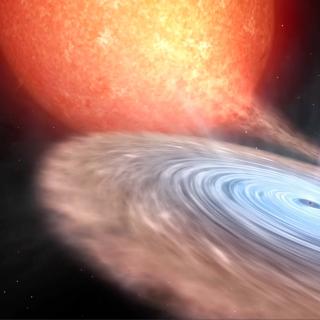Bibcode
Hill, C. A.; Watson, C. A.; Shahbaz, T.; Steeghs, D.; Dhillon, V. S.
Referencia bibliográfica
Monthly Notices of the Royal Astronomical Society, Volume 444, Issue 1, p.192-207
Fecha de publicación:
10
2014
Número de citas
19
Número de citas referidas
17
Descripción
We present Roche tomograms of the K4V secondary star in the cataclysmic
variable AE Aqr, reconstructed from two data sets taken 9 d apart, and
measure the differential rotation of the stellar surface. The tomograms
show many large, cool starspots, including a large high-latitude spot
and a prominent appendage down the trailing hemisphere. We find two
distinct bands of spots around 22° and 43° latitude, and
estimate a spot coverage of 15.4-17 per cent on the Northern hemisphere.
Assuming a solar-like differential rotation law, the differential
rotation of AE Aqr was measured using two different techniques. The
first method yields an equator-pole lap time of 269 d and the second
yields a lap time of 262 d. This shows that the star is not fully
tidally locked, as was previously assumed for CVs, but has a co-rotation
latitude of ˜40°. We discuss the implications that these
observations have on stellar dynamo theory, as well as the impact that
spot traversal across the L1 point may have on accretion
rates in CVs as well as some of their other observed properties. The
entropy landscape technique was applied to determine the system
parameters of AE Aqr. For the two independent data sets, we find
M1 = 1.20 and 1.17 M⊙, M2 = 0.81
and 0.78 M⊙, and orbital inclinations of 50° to
51° at optimal systemic velocities of γ = -64.7 and -62.9 km
s-1.
Proyectos relacionados

Agujeros negros, estrellas de neutrones, enanas blancas y su entorno local
Los agujeros negros y estrellas de neutrones en binarias de rayos-X son laboratorios únicos para explorar la física de estos objetos compactos. No solo permiten confirmar la existencia de agujeros negros de origen estelar a través de mediciones dinámicas de sus masas, sino que también permiten investigar el comportamiento de la materia y la
Montserrat
Armas Padilla